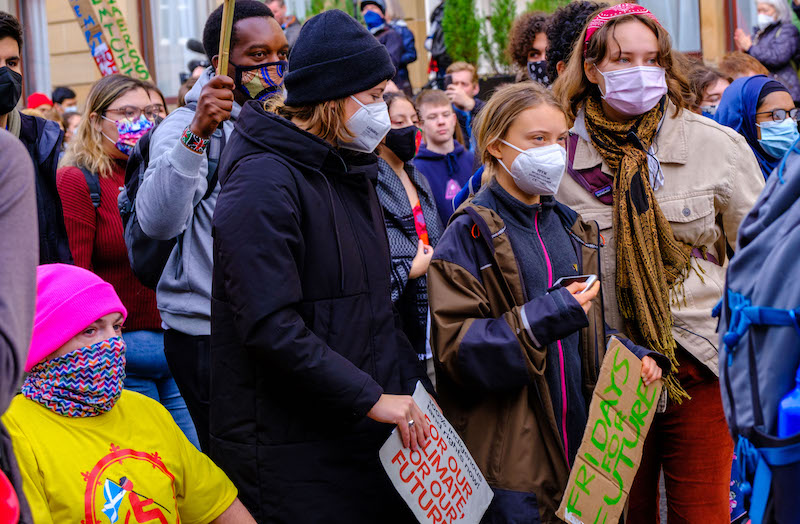© Jess Hurd
COP26 started in Glasgow on Sunday 31 October with the preliminary discussions clearing the way for the arrival of world leaders. Joe Biden and other G7 leaders flew in from their meeting in Italy and were met by fleets of limousines to ferry them to their fancy hotels.
Unfortunately, many of the people most affected by climate change – the indigenous people of the Global South – are in Glasgow in much fewer numbers than at any previous COP, due to the UK government’s failure to make good on its promise to supply vaccines to all registered delegates and observers, and the restrictive visa regulations. This makes COP26 the most exclusive global climate change gathering ever.
Also here in reduced numbers are the representatives of trade unions from across the globe. The UK TUC’s numbers were reduced, and so many delegates representing the International Trade Union Confederation (ITUC), including myself, were only given credentials to attend one week out of the two.
So instead of joining the delegates at the first day’s proceedings, I attended in the city’s George Square, firstly for a demonstration against Indian Prime Minister Modi, organised by the Indian Workers Association, protesting the attacks on Indian farmers and the racist policies his government pursues, and then for a vigil by faith groups from across the world.
As I walked along by the Clyde I met a group of Greenham Common women, who had walked from the nuclear submarine base at Faslane to join the actions to stop climate catastrophe, like cancelling the multi-billion pound Trident programme!

Stephen Smellie and UNISON general secretary Christina McAnea on Saturday’s March for Climate Justice © Jess Hurd
Monday and Tuesday were the world leaders’ days, with a succession of speeches both from the leaders of the rich Global North, who have burned most of the fossil fuels in the past two centuries and who are determined to protect the profits of their corporations, and those from the Global South, whose people, economies and environments are being destroyed now.
Mia Mottley, the Prime Minister of Barbados, noted that the promises of action and finances had not materialised and warned that a 2°C rise in temperatures is “a death sentence”.
The UNISON-supported COP26 Coalition kicked off a series of Movement Assemblies on the Monday, with contributions from across the global climate change movement. I was honoured to address the the assembly, firstly welcoming people to Glasgow, a city built on the profits of slavery and the burning of coal, which sums up the twin global crisis of colonialism and global warming. I was able to explain the aims of the trade union movement for a just transition involving workers and trade unions in the design of a greener economy.
One of the demands of the Global South is for climate finance. $100 billion dollars was promised each year starting in 2020, but it has not been delivered. This is intended to help the developing nations adapt to climate change. However, they point out that in many cases the seriousness of the situation is such that they have moved beyond ‘adaptation’.
ome island nations are looking at relocating people whose homes have been destroyed and water sources have been ruined by rising sea levels. Therefore, they are seeking compensation for the loss and damage caused by the actions of the rich countries, a demand supported by the ITUC.

Greta Thunberg on the Fridays for Future climate march ©Jess Hurd
Once the world leaders had jetted back out of town, the ministers and officials got on with the negotiations towards an accord that will map out the actions they will agree going forward. The world hopes these will ensure global warming is kept to the Paris target of 1.5°C or no more than 2°C. The observers, including the ITUC, continued to lobby, hoping to push them in the right direction.
The main business is to finalise Article 6 from the Paris Agreement from 2015. This committed governments to creating carbon markets, which they have failed to agree in subsequent COPs. The idea is that industrial countries can continue burning fossil fuels but ‘offset” them by paying countries in the Global South to take actions to retain and extend forests, therefore sucking carbon out of the atmosphere. This is a crucial part of the plan to achieve ‘net zero.’ But it’s criticised by many for allowing rich countries to continue burning fossil fuels and not taking sufficient action to reduce emissions as the poorer countries act as carbon sinks.
Since ‘market solutions’ have failed to address the issue of poverty or inequality, or pretty much anything else, it seems unlikely that it will solve the crisis of climate change!
Alongside these formal negotiations, discussions take place between governments and announcements are made. So, last week, Boris Johnson announced that several countries had reached an agreement to end deforestation by 2030. Further announcements were made on reducing methane emissions. These are welcome announcements. However, they are not part of any formal COP agreement, so there are no measures in place to hold those governments, including our own, to account if they do not deliver on their promises.
On Wednesday, the ITUC’s first aim for the COP was achieved with the declaration of support for just transition through green growth, decent work and economic prosperity as economies move towards net-zero emissions. This should mean that the details of any climate actions agreed at COP or by individual states should include provision for just transition, including engagement with trade unions. UNISON and the TUC will be speaking with the UK government on how it delivers on this.
Thursday saw Trade Unions for Energy Democracy convene an international meeting to launch a programme for addressing an energy transition to renewables through public ownership of energy generation, supply and distribution. The programme reflects a detailed report, to which UNISON’s [national officer for energy] Matthew Lay contributed, on how only publicly owned energy will be able to make the transition needed.
Thursday night saw the COP26 Coalition’s Movement Assembly focus on workers and trade unions, with speeches from the STUC’s Roz Foyer, David Boys, the deputy general secretary of Public Services International, and others.

UNISON members make their presence felt at the march for climate justice ©Jess Hurd
Greta Thunberg was in town of course, not least for the Fridays For Futures climate strike. Any doubts about the people of Glasgow’s support for action on climate change were dispersed when 20,000, mostly young people marched in a joyous procession through the city on Friday, toward a rally in George Square.
The creativity and enthusiasm of Scotland’s young people was on show throughout the day, with UNISON activists joining the ‘older’ people on the march, showing solidarity with the youth. Greta addressed the packed square and was cheered to the heavens when she denounced the “Blah, blah, blah” of world leaders. The sun shone and thousands went home energised by the event.
The following day, the heavens opened and the wind blew strongly, as if to remind us that the issue at stake was the climate. However, fears that the horrible weather would keep people at home for the Global Day of Action for Climate Justice did not materialise, as Kelvingrove Park filled up with people from all over Scotland, from down south and from across the world.
Matt Wrack of the Fire Brigades Union addressed the gathering crowds atop a red fire engine. Christina McAnea met UNISON activists and members with their banners, flags and UNISON’s giant balloons. Indigenous groups and Black Lives Matter activists mixed with Global Justice campaigners. Socialists, independence supporters, Extinction Rebellion and school groups chanted slogans.
The trade union and workers bloc, with the UNISON contingent to the fore, was a large part of the march to Glasgow Green, for the rally. As the last of the marchers, the cyclist bloc, arrived five hours after the Indigenous bloc had led the way, it was starting to get dark and the world leaders had received a strong message from the people of the world that action on climate change is needed now.







